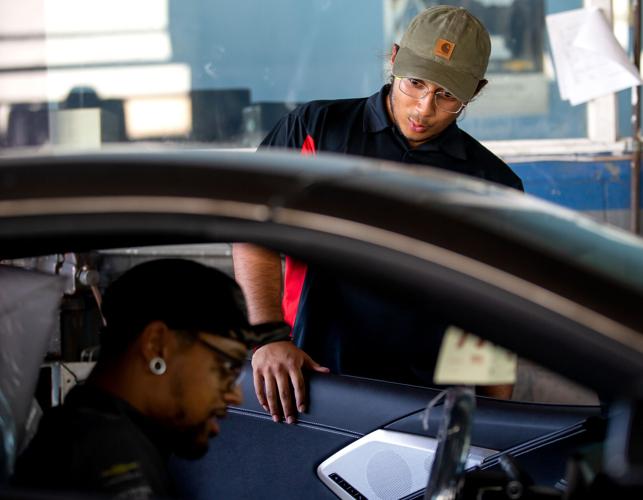A beloved cousin succumbs to cancer, a best friend dies by suicide, a parent and then a grandmother are lost to COVID-19.
These losses were being carried by three young people here who did not have any significant grief support until they joined a new bereavement group set up just for them and their peers.
Over the last 18 months, nearly 40 teens and young adults ages 16 to 24 have participated in a group therapy program created to help them cope with loss in healthy ways.
In addition to unresolved grief, these young people are also dealing with challenges such as poverty, homelessness and addiction, hardships that make it difficult for them to finish high school or hold jobs.
“What we started to notice is that a good majority of the youth had experienced death loss and had not had that bereavement addressed,” said Lance Meeks, senior program manager for Tucson's Goodwill Metro Youth Center, referring to the young people he works with in a program called "Opportunity Youth."
“It’s very difficult for them to process grief with all the other things they have going on,” Meeks said.
The grief group is a collaboration between Meeks' agency as well as Tu Nidito, the Pima County Juvenile Court Center and the United Way of Tucson and Southern Arizona. It's funded through a three-year grant from the Vitalyst Health Foundation, said Linda Hardy, program director with Tu Nidito, a local agency that offers grief support for children and families.
She is looking for ways to keep it going far beyond the next 18 months.
“Many of these youth have never had an opportunity to come to a safe place and talk about the losses that they’ve had,” she said. “They’ve felt very isolated.”
'Not accepting that he was gone'
One of the youths who participated in a recent bereavement series is Deana Nuñez, who lived on the Navajo Nation for most of her teen years but returned to Tucson after her father died here of COVID-19.
Nuñez, 20, moved in with her grandmother and began working to finish high school with help from Meeks' program through Goodwill Industries of Southern Arizona. Then her grandmother died, too — also from COVID.
One of the most difficult days was last month, on the one-year anniversary of her father’s death. She had attended a family gathering to pray the rosary and felt overwhelmed.
In a survey of youths with current or previous involvement with the juvenile justice system in Pima County, one of the top reported traumas is having experienced the death of a loved one or family member.
to be trusted to tell his story, and I hope that by telling his story we can begin to build a more compassionate and equitable world. Learn more and get involved at www.azendoflifecare.org
“I was not accepting that he was gone,” she said.
“I reached out to people at Goodwill,” she said, explaining she told them all that had happened over the last year. She appreciated the way it was set up with icebreakers first, and then the real sharing started.
“I didn’t know how I would feel telling strangers about my grief,” said Nuñez. “It was amazing to see everyone participate and talk and share their stories.”
'Helped me so much'
Another participant is Timothy Young, who recently turned 18.
He has been carrying the weight of a dear cousin's death for the last seven years.
Originally from Arkansas, Young says he moved here about five years ago after his home life became unlivable. He has had periods of time when he was living on the street, stealing food to survive and not having any idea how to deal with profound feelings of loss.
Most recently, he's been moving from group home to group home, but he's hopeful: He's working to finish his education — he hopes to be done by February — and feels supported by Meeks and the community he's met at Opportunity Youth.
“They've helped me so much,” he said. “I didn’t realize what I was doing until I sat down with Lance to talk about it.”
After participating in group therapy, he said, the grief is no longer as overwhelming or scary.
Alexander Smith, 21, got to know Young as part of Smith's recent Americorps position. He's also working at O’Rielly Chevrolet Tucson right now, while he finishes up work he needs to complete high school.
He was initially hesitant to join the grief group, he said, since he had never been part of anything like that before.
“It opened my eyes once I took the chance,” Smith said. "It opened my eyes to the beauty of finding support in a community of people who were there to support me in a very specific way."
Smith lost one of his best friends a few years ago to suicide but never really processed it.
“I never really knew how to deal with something like that,” he said. “It was common among my peers to be losing people. I never viewed it as something to heal from, something to honor.”
For most of his teen years, Smith says, he was moving to live between relatives, experimenting with drugs and then dealing with addiction.
About 18 months ago, he said, he “hit a place of desperation.”
“I was tired of where I was at, and I ended up at Goodwill,” he said. “I was tired of my past. It had to be better than what was behind me.”
He has been sober since that time.
“They accepted me," he said of the group "and met me where I was."





